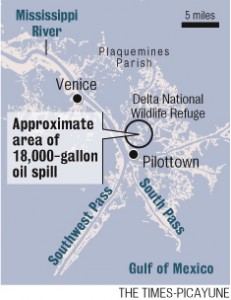By Bob Warren, The Times-Picayune
April 06, 2010, 9:10PM
Petty Officer 3rd Class James Peterson takes a sample Tuesday from an oil spill about 10 miles southeast of Venice in the Delta National Wildlife Refuge.
Crews worked Tuesday to contain the oil from a spill in the Delta National Wildlife Refuge, the Coast Guard said.
At approximately 1 a.m., Tuesday, Berry Brothers General Contractors notified the Coast Guard that oil was discharging into a canal located approximately 10 miles southeast of Venice. Chevron Pipeline Co., which operates the pipeline, reported that approximately 18,000 gallons of crude oil were released.
The Coast Guard Sector New Orleans, the Louisiana Oil Spill Coordinator’s Office – Department of Public Safety and Corrections and Chevron responded to the spill to try and minimize damage to the refuge.
The Coast Guard evaluated the spill by air and the Louisiana Department of Environmental Quality and the Coast Guard had pollution investigators in response boats on scene assessing the oil’s impact and monitoring clean-up efforts.
Coast Guard Lt. Stephen Nutting said the Mississippi River has not been impacted by the spill.
“Right now, we’re trying to contain it in the refuge,” he said.
Upon receiving the initial report of the spill, Chevron immediately closed the affected section of the pipeline and has initiated its emergency response procedures, the Coast Guard said.
The pipeline is owned by Cypress Pipe Line Company, which is a joint venture between British Petroleum and Chevron Pipeline Co.
The Coast Guard is investigating the cause of the spill.
© 2010 NOLA.com.
http://www.platts.com/RSSFeedDetailedNews.aspx?xmlpath=RSSFeed/HeadlineNews/Oil/6933006.xml
Crude line leaks into Louisiana wildlife refuge: USCG
Houston (Platts)–6Apr2010/607 pm EDT/2207 GMT
The US Coast Guard, Louisiana Oil Spill Coordinator’s Office and Chevron Pipe Line Company were working to contain an oil spill from a Chevron-operated crude pipeline in the Delta National Wildlife Refuge, according to a statement issued by the Coast Guard.
The leak involved about 429 barrels of crude oil and occurred around 1 am CDT Tuesday, according to the statement. The leak resulted in crude oil being discharged into a canal about 10 miles southeast of Venice, Louisiana.
This pipeline originates from an offshore oil platform in the Gulf of Mexico and terminates at the Empire Pipeline Terminal, said an official from the Louisiana Oil Spill Coordinator’s office. The Empire terminal is located in far southern Louisiana, on the east bank of the Mississippi River. The terminal has the capacity to store 1.3 million barrels of oil, according to information published on Chevron Pipeline Company’s web site.
CPL has shut the leaking segment of the crude pipeline. Cypress Pipe Line Company is a joint venture between CPL and BP.
–Esa Ramasamy, esa_ramasamy@platts.com
